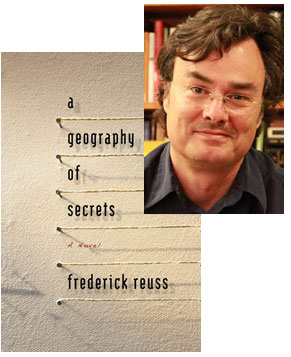Why Did Oprah Pick Freedom?
 After several weeks of speculation, the Associated Press has jumped the gun on Oprah Winfrey and announced that her next Book Club selection, which she’s planning to unveil on tomorrow’s show, is Jonathan Franzen’s Freedom. (I didn’t think it would be at first, in part because Macmillan went to unprecedented lengths to obscure the selection, but I’ve heard from folks who confirm the AP’s reporting.) So immediately folks on the Internet start going, “Why? Oprah and Franzen hate each other!”
After several weeks of speculation, the Associated Press has jumped the gun on Oprah Winfrey and announced that her next Book Club selection, which she’s planning to unveil on tomorrow’s show, is Jonathan Franzen’s Freedom. (I didn’t think it would be at first, in part because Macmillan went to unprecedented lengths to obscure the selection, but I’ve heard from folks who confirm the AP’s reporting.) So immediately folks on the Internet start going, “Why? Oprah and Franzen hate each other!”
(In that vein, I was amused at the Franzen reading at the Decatur Book Festival two weeks ago, when the crowd tittered nervously when an audience member mentioned Oprah in his question to the author. What, did they think he was going to snap, jump off the stage, and rip the guy’s head off?)
Well, look, it’s been nearly a decade; people grow up and they stop wasting time and energy on the stupid things that bugged them nine years ago. It’s the final season of Oprah, and frankly I suspect she’s tying up some karmic loose ends in an effort to create a more uniformly positive universe for herself. But the most important thing is: Freedom is an excellent novel, not perfect by any means but definitely worth recommending to millions. And given that Franzen’s ambivalence towards all the non-literary aspects of trying to be a literary author in a commercial marketplace hasn’t changed, it should make for an interesting hour of television.
16 September 2010 | theory |
Frederick Reuss: Mapping Out Our Own Territories

A Geography of Secrets traffics in the territory of international thrillers, but its concerns are much more intimate and personal. Some of it is the story of of Noel, who works at the Defense Intelligence Analysis Center plotting coordinates for the U.S. military to drop bombs in Afghanistan, and is undergoing a serious crisis of faith at both work and home—but it’s also the story of the unnamed narrator, who has only the briefest encounter with Noel and is much more concerned with uncovering the truth about his recently deceased father, who may have been more than a career Foreign Service diplomat. The narrator does have cartography in common with Noel, though, and Frederick Reuss leads each chapter of the novel with the longitude and latitude coordinates for the setting. (You can verify this in Google Earth.) In this essay, Reuss explains how technological capabilities open up literary possibilities.
Growing up, my father always made a game of travel. He called it “exploring.” Whenever we arrived in a new place he’d always go off—usually on his own—and then suddenly reappear with a big “surprise” smile on his face. I came to appreciate his methods when I began my own solo travels. In my twenties, I did my first transcontinental road trip on a motorcycle—inspired, like so many others back then, by Robert Pirsig’s Zen and the Art of Motorcycle Maintenance. Reading a map on a bike isn’t an easy thing to do. I had a compass mounted on the gas tank, vowed to stay off interstates, took only secondary roads and rode around lost much of the time.
You notice things when you’re lost, things that might otherwise go unnoticed—big and little details, features of land and cityscape. There is no better way to discover and become situated in an unfamiliar place than to be lost in it for a time. To draw one’s own map, even a crude one, or trace one’s progress on a printed chart is the ultimate way of connecting to and locating oneself in a landscape.
If my motorcycle trip would have been utterly different with GPS or Google Earth, writing A Geography of Secrets would have been impossible without them. The geo-coordinates that start each chapter form a map of the cartographer/narrator’s quest, a subjective triangulation of the world to bring order and coherence to his life. Geotagging, which has evolved with Google Earth into a kind of hobby and game, is an intriguing new form of self expression—photographic projections, by people, of their presence on the globe. It shows how deeply the urge to locate and be located goes. Satellite photography shows us where we are. (I can see my house from here!)
15 September 2010 | guest authors |

 Our Endless and Proper Work is my new book with Belt Publishing about starting (and sticking to) a productive writing practice.
Our Endless and Proper Work is my new book with Belt Publishing about starting (and sticking to) a productive writing practice. 
